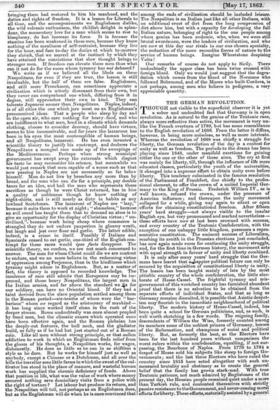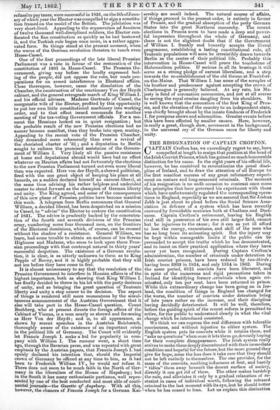THE GERMAN REVOLUTION.
THOUGH not visible to the superficial observer it is yet a sober and undoubted fact that Germany is in open revolution. As is natural to the genius of the Teutonic race, always more reflective than active, the movement is very un- like the French overturn of 1789, but has some resemblance to the English revolution of 1688. From the latter it differs, however, in being more noiseless, as well as more intricate. -Whereas the revolution of 1688 was chiefly a struggle for liberty, the German revolution of the day is a contest for unity as well as freedom. The prelude to the drama has been playing since 1848, under manifold exertions for gaining either the one or the other of these aims. The cry at first was mainly for liberty, till, through the influence of the more educated classes, particularly the youth of the universities, it changed into a supreme effort to obtain unity even before liberty. This tendency culminated in the famous resolution of the Parliament of Frankfort, due chiefly to the profes- sional element, to offer the crown of a united Imperial Ger- many to the King of Prussia. Frederick William IV., as is well known, refused the crown, under the pressure of Austrian influence ; and thereupon the unity movement collapsed for a while, giving way again to silent or open efforts for obtaining constitutional freedom. After fifteen years' hard struggle—not always visible to the insular English eye, but very pronounced and marked nevertheless— these efforts have now at last been crowned with success, and every country of the Teutonic Confederation, with the exception of one unhappy little kingdom, possesses a repre- sentative constitution. The eminent success of Liberalism, reaching its zenith in the Prussian elections just concluded, has now again made room for continuing the unity struggle, and, for the first time in German history, the movement acts with equal strength in favour of unity and liberty combined. It is only after many years' hard struggle that the Ger- mans have learnt that ajiappier political future can only be secured by the acquisition of constitutional liberty in unity. The lesson has been taught mainly of late by the most pitiable country of the whole confederation, the little elec- torate of Hesse-Cassel. The frightful tyranny and mis- government of this wretched country has furnished abundant proof that there is no salvation to be obtained from the separate efforts of individual States, and that as long as Germany remains disunited, it is possible that Asiatic despot- ism may flourish in the immediate neighbourhood of political liberty. The modern history of Hesse-Cassel, indeed, has been quite a school for German politicians, and, as such, is well worth sketching in a few words. The reigning family, descendants of William the Wise, formerly counted among its members some of the noblest princes of Germany, heroes of the Reformation, and champions of social and political liberty. But, as formerly the best, so the Electors have been for the last hundred years without comparison the worst rulers within the confederation, equalling, if not sur- passing, the Bourbons of Naples. From 1776 to 1784 a despot of Hesse sold his subjects like sheep to foreign Go- vernments ; and the last three Electors who have ruled the country since 1815 have acted altogether with such un- measured brutality and obstinacy as to create the general belief that the family has grown stark-mad. With true Teutonic patience, not much admired by Englishmen of the present day, the Hessian people remained quiet under a more than Turkish rule, and contented themselves with strictly passive resistance to the Government, and never-ceasing moral efforts forliberty. These efforts, materially assisted by a general refusal to pay taxes, were successful in 1831, on the 5th of Janu- ary of which year the Elector was compelled to sign a constitu- tion framed on the model of the British. The jubilation was very short-lived. Appealing to the argumentum ad hominem of twelve thousand well-disciplined soldiers, the Elector con- fiscated the fine constitution as quickly as he had bestowed it, and the Turkish rule began once more, in a rather aggra- vated form. So things stand at the present moment, when the waves of the German revolution threaten to touch even Hesse-Cassel.
One of the first proceedings of the late liberal Prussian Parliament was a vote in favour of the restoration of the constitution of 1831 in Hesse-Cassel. The Prussian Go- vernment, giving way before the loudly expressed feel- ing of the people, did not oppose the vote, but made pre- parations for an armed interference in Electoral affairs. Close thereupon, however, came the dissolution of the Chamber, the construction of the reactionary Von der Heydt cabinet, and the general retrograde march of King William I. and his official advisers. Madame Gertrude of Cassel, the morganatic wife of the Elector, profited by this opportunity to put her own little constitutional machinery into working order, and to that effect issued commands for another meeting of the tax-voting Government 'officials. For a mo- ment the Hessians looked on in quiet resignation ; but the probable result of the new Prussian elections had no sooner become manifest, than they broke into open mutiny. Appealing to the recent vote of the Prussian Chamber, they demanded more vehemently than ever a revival of the cherished charter of '31; and a deputation to Berlin sought to enforce the promised assistance of the Govern- ment of William I. Very likely all the passive resistance at home and deputations abroad would have had no effect whatever on Hessian affairs had not fortunately the elections to the new Prussian Parliament turned out even more liberal than was expected. Herr von der Heydt, a shrewd politician, fired with the one great object of keeping his place at all hazards, on a sudden declared himself an earnest liberal, at the same time advising his rather helpless and undecided master to stand forward as the champion of German liberty and unity. The King agreed, and some of the consequences of this new phase of Prussian politics have become manifest this week. A telegram from Berlin announces that General Willisen, a decided liberal, has been despatched on a mission to Cassel, to " advise" the Elector to restore the constitution of 1831. The advice is prudently backed by the concentra- tion of the fourth and seventh divisions of the Prussian army, numbering some four thousand men, on the frontiers of the Electoral dominions, which, of course, can be crossed without the shadow of a resistance. General Willisen, we learn, had some trouble to obtain an audience of his Serene Highness and Madame, who seem to look upon these Prus- sian proceedings with that contempt natural to thirty years' successful despotism. The existence of a German revolu- tion, it is clear, is as utterly unknown to them as to King Pepple of Bonny, and it is highly probable that they will not see before they have come to feel.
It is almost unnecessary to say that the resolution of the Prussian Government to interfere in Hessian affairs is of the highest importance, both as showing that King William I. has finally decided to throw in his lot with the party desirous of unity, and as bringing the great question of Teutonic liberty and unity a step nearer to its decision. The aspect of things is rendered still more momentous by the simul- taneous announcement of the Austrian Government that it also will take part in the Hesse-Cassel question. Count Rechberg, who at present directs the foreign affairs of the Cabinet of Vienna, is a man nearly as shrewd and far-seeing as Herr Von der Heydt ; and is, to all appearance, as shown by recent speeches in the Austrian Reichsrath, thoroughly aware of the existence of an important crisis in the political life of Germany. The Count will evidently let Francis Joseph I. make a bid for popularity in com- pany with William I. The rumour went, a short time ago, through the Bavarian press, and was repeated with great emphasis by the Austrian papers, that Francis Joseph I. had openly declared his intention that, should the Imperial crown of .Germany be offered at any time to him, as it bad been to Frederick William IV., he would not refuse it. There does not seem to be much faith in the North of Ger- many in the liberalism of the House of Hapsburg ; but in the South it has many enthusiastic partizans, well repre- sented by one of the best conducted and most able of conti- nental journals—the Gazette of Augsburg. With all this, however, the chances of Francis Joseph for a German Kai- sership are small indeed. The natural course of affairs, if things proceed in the present order, is entirely in favour of Prussia, and the gradual absorption of the petty German States into the great Northern monarchy. The recent elections in Prussia seem to have made a deep and power- ful impression throughout the whole of Germany, and there is not the slightest doubt that if the Government of William I. frankly and honestly accepts the liberal programme, establishing a lasting constitutional rule, all Teutonic populations will soon be irresistibly drawn towards Berlin as the centre of their political life. Probably this intervention in Hesse-Cassel will prove the touchstone of Hohenzollern politics. If serious in all its bearings it will serve as a strong pledge of earnest liberalism, and a step towards the re-establishment of the old throne at Frankfort- on-the-Maine. That William I. has none of the scruples of his brother and predecessor against accepting the crown of Charlemagne is generally believed. At any rate, his Ma- jesty is fond of coronation ceremonies, and not at all averse to seeing the royal ermine dangling from his shoulders. It is well known that the coronation of the first King of Prus- sia, and the elevation of the country to an independent state, was chiefly brought about by the innate fondness of Frederick I. for pompous shows and solemnities. Greater events before this have been effected by smaller causes. Here, however, is really a great, though slow, movement in the background, in the universal cry of the German races for liberty and unity.































 Previous page
Previous page